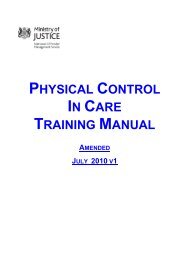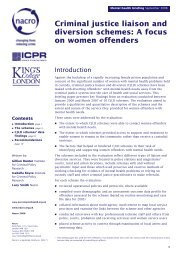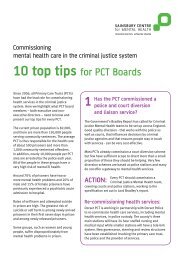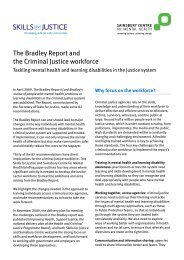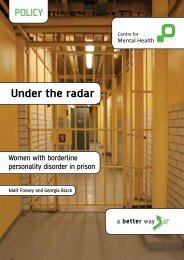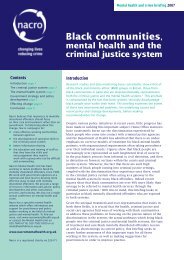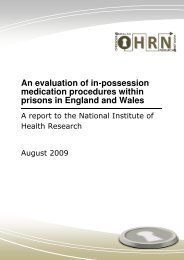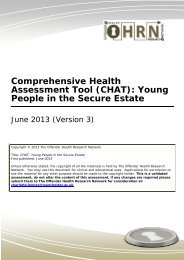Engendering Justice - from Policy to Practice - The Fawcett Society
Engendering Justice - from Policy to Practice - The Fawcett Society
Engendering Justice - from Policy to Practice - The Fawcett Society
- No tags were found...
You also want an ePaper? Increase the reach of your titles
YUMPU automatically turns print PDFs into web optimized ePapers that Google loves.
Chapter One: Continued.Methodology and an Overview of the Work of the CommissionWe are especially grateful <strong>to</strong> the women’s associationsand membership associations within the variouscriminal justice agencies as well as organisationswithin the voluntary sec<strong>to</strong>r who facilitated thisprocess and the numerous individuals who gaveup their time <strong>to</strong> share their views with us. <strong>The</strong>rewas an overwhelming response <strong>to</strong> our work withover 500 questionnaire responses received.<strong>The</strong> evidence gathered by the Commission wasprimarily qualitative and the survey responses <strong>from</strong>offenders, victims, specialised agencies and workersin the criminal justice system have not been codedfor statistical analysis. Content analysis is focusedon broad themes and recurring concerns which areaddressed throughout the report. <strong>The</strong> focus in the texthas been on giving voice <strong>to</strong> the diverse experiencesof individual women. <strong>The</strong> emphasis is on “buildingknowledge <strong>from</strong> women’s lives – a commitment that,feminists believe, has wider implications that have thepotential <strong>to</strong> transform existing knowledge frameworks.” 1<strong>The</strong> Commission Model – a meansfor achieving real change<strong>The</strong>se evidence sessions provided the Commission witha valuable opportunity <strong>to</strong> hear first-hand informationand <strong>to</strong> follow up issues which were of particularconcern <strong>to</strong> Commissioners. We would like <strong>to</strong> thankall attendees who gave up their valuable time <strong>to</strong>share their experiences and expertise with us.Vera Baird QC MP, Solici<strong>to</strong>r General and BaronessJean Cors<strong>to</strong>n (Chair) at a meeting of the Commission on4 March 2009A key aim of this final report was <strong>to</strong> incorporate the voicesof women who have experienced the criminal justice systemas women accused or convicted of criminal offences;female victims of crime; women working within the variouscriminal justice agencies; and organisations working withfemale victims of crime and/or female offenders. Specificallydesigned questionnaires were distributed within theprison service, the police force, the legal profession, thejudiciary, the magistracy, the Crown Prosecution Serviceand the Probation Service as well as <strong>to</strong> organisations andindividual women via the internet and various networks.This is the final phase of our work. <strong>The</strong> use of aCommission model has proven particularly effective asit has enabled the work <strong>to</strong> go beyond a ‘one-off’ reportand we have not been confined in relation <strong>to</strong> the breadthof issues which we could explore. <strong>The</strong> five year durationof the Commission has allowed extensive follow-upwork <strong>to</strong> be carried out in order <strong>to</strong> track progress onrecommendations by the criminal justice agencies.Through authoritative research, high level lobbyingand media interventions, the Commission hasachieved a number of key changes.Successful lobbying for the introduction of a dutyon public bodies <strong>to</strong> promote gender equality:In its original report, the Commission recommendedthat legislation on gender should be brought in line withlegislation on race by introducing a positive duty on publicauthorities <strong>to</strong> have “due regard” <strong>to</strong> the need <strong>to</strong> eliminateunlawful sex discrimination and <strong>to</strong> promote genderequality. <strong>The</strong> gender equality duty was introduced in theEquality Act 2006, and came in<strong>to</strong> force in April 2007.Page 14



